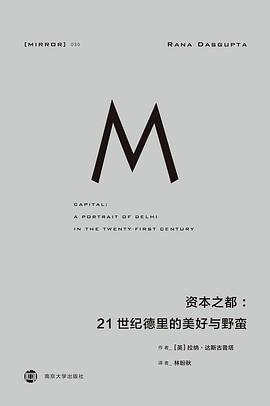WULOLIFE
《资本之都》作者: [英] 拉纳·达斯古普塔 出版社: 南京大学出版社
《资本之都》作者: [英] 拉纳·达斯古普塔 出版社: 南京大学出版社
Couldn't load pickup availability
Description
内容简介 · · · · · ·
当德里搭着金钱和野心的高速列车飞奔向世界时,
许多人一夜致富,更多人在自己的家园成为难民。
贪婪、暴力、焦虑、边缘化成为理解德里的关键词,
这是现代资本主义社会的缩影与许多城市未来的共同面貌。
【编辑推荐】
★梁文道、刘瑜、熊培云、许知远联袂主编——“理想国译丛”(MIRROR)系列之一(030)——放性的思想和非功利的眼睛,看看世界的丰富性与复杂Description贫民窟并存,机遇和腐败共生的所在,呈现出一幅与资本主义相遇的德里城市肖像。
★《资本之都》讲述的主体是印度与德里,更是现代资本主义社会的缩影与许多城市未来的共同面貌。拥有炫目财富和复杂文化的地区受殖民政权接管,遭受文化摧毁、财富掠夺,并经历了种族灭绝的灾难,后殖民政府则深陷经济重建与权力斗争,最终让路给了充满活力的自由市场。过去的历史创伤如同幽灵般飘荡在贪婪、野心、欲望、剥削之间,中产阶级也感到焦虑疲惫,金钱成为德里人生活的目标,也成为宰制生活的枷锁。
★《资本之都》的核心主题是正崛起于印度城市中的富人,他们搭乘全球化的列车,在被资本主义彻底改造的德里获取财富、地位与权力。这群新兴中产阶级通过无限商机建立起庞大的商业帝国,为城市注入活力和西方的生活方式,也为崛起的印度带来生机和希望。时他们对土地和资源的争夺、对金钱的渴望,严重剥削了农民和穷人,改变了政治、住房、医疗、教育等各面向的运作规则,令德里被笼罩在资本主义的阴影中。
★ 荣获2017年“瑞斯札德﹒卡普钦斯基报道文学奖”(Ryszard Kapuściński Award: Orwell Prize)和“决选名单。
【内容简介】
一个百万富翁与贫民窟并存,机遇和腐败共生的所在。自1991年宣布开放市场以来,首都德里在风起云涌的经济改革中,从印度北部一个饱受历史创伤的文化古城变身为具有全球影响力、蓄积丰沛资本的国际都市。通过国际业务外包、房地产炒作等各种商业活动,新兴中产阶级其生活方式也变得越来越现代化、美国化。当他们的财富藉由巧取豪夺而与城市的天际线一起冲向云端时,这座城市中经济难民和贫民窟的数量也随之攀升。
全球资本市场为德里带来转变、宰的房地产市场政体系与贪污腐21世纪的德里居民面临了愈发严峻的挑战。无论富人、中产阶级、拾荒者,还是罪犯,无人能置外于这场毁坏与创造的矛盾。
作为一个从印度移往英国的二代移民,达斯古普塔以一种既亲切又好奇的心情重新回到自己先祖的土地上,通过自己的观察和对德里居民的采访,以小说家的生花妙笔将德里的历史与当下交织成篇,为城市发展大潮下的疏离与残酷留下客观的纪录——在资本主义和全球化席卷世界的今日,被金钱资本淹没的德里既是许多城市共同的过去,未来。
【名家推荐】
这本书充满了启发性的细节和生动的印象,涵盖从商业到娱乐,从性到婚姻等各方面,展现德里如何成为一个从居民背上建造起来的机会之地。达他们将德里引向全球经也是一个令人难忘的警示。
——《出版人周刊》
生活了十多年的英国印度小说家对一个失去灵魂的城市所做的深入、令人不安的探索……面对印度经历的社会和文化上痛苦的转变,这是次真诚又令人担忧的审视。
——《科克斯书评》
拉纳·达斯古普塔凭着洞察力、人道关怀以及精妙优美剥去德里层层的否认掩饰。他成功地以引人入胜而非令人排斥的方式掀开早已溃烂的伤口……他带来理解的洞见,也深入到政治和金钱的关系网络……他惊人的结论是,这个拥有近两千万人口、作为新世界秩序引擎的城市,并非因它的不成熟而有趣,而是因为它的成熟看起来与我们所期望的完全不同……看着当代德里就如同看着全球21世纪最耀眼、最前卫的样貌。
——《时代周刊》
一幅精美写就的城市肖像,这座城市腐败、暴力、满是伤痕,且发展快速得连其居民都几乎认不出来了。这是一位大作家创作巅峰时令人惊叹的杰作。
——威廉·达尔林普尔(William Dalrymple),《精灵之城:德里一年》作者
达斯古普塔的目光敏锐,他对微小时刻的敏感使得这本非凡且温柔的书在读者心里如同一系列惊人的短篇小说一般流连不去。 在德里,被破坏、四面楚歌、惊人的突变。
——《展望》杂志
且常令人感到可怕的……达斯古普塔与各式各样的现代德里人的抒情相遇,揭示了一个小说家的耳朵,更被精美地勾勒……如果那是因为他在乎。
——《每日电讯报》
贪婪、不人道,以及让这座城市及其人民陷入伤痛的恶性循环的愤怒——这些就是达斯古普塔向我们展示并让人感到无比震惊的。
——《每日野兽》
拉纳·达斯古普塔的杰作提供了一部现代德里与数百万益发富有的奋斗者的史诗般戏剧性肖像。
——《麦考林》杂志
正如在他的小说中,达斯古普塔以沉着的方式摧毁了时间和空间的界限,在今天的模式中找到了过去的怨气,理解和神话的连续性。
——《明潮》杂志
一幅有钱德里毫不留情的肖像……达斯古普塔的写作天赋与他从研究对象那里探得惊人坦率的能力是相匹配的……在最近关于印度自由市场革的一本。
——《纽约客》
一部非常优雅的作品,其浓郁的风格和范围常常让人想起奈保尔的《印度:百万叛变的今天》。
——《新政治家周刊》
达斯古普塔用他的素材更广泛地反思了资本主义的美好与野蛮、旨趣与动力、轻率与非道德……《资本之都》主要是一本关于德里的财富与名门望族的书。然而也有一些生动的篇章用于描述那些讲英语的中产阶级,以及在这一阶级中的世代变化……与商人或毒贩子访谈的摘录部分既令人吃惊又让人胆寒……达斯古普塔的分析总是很独到,其写作也总是不同凡响。
——拉马钱德拉·古哈(Ramachandra Guha),《新共和周刊》
作者通过深度采访搜集所有资料,详细剖析了促成该地区“财富至上”文化的原因……这本书是非常成功的创意类纪实文学作品。
——Chinese:Betsy Hartmann
